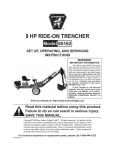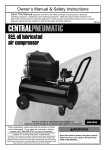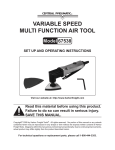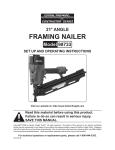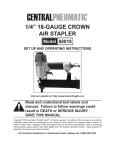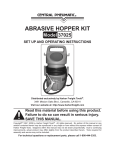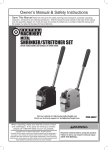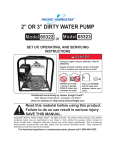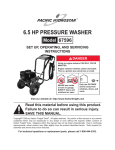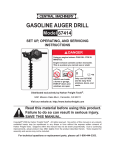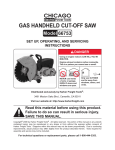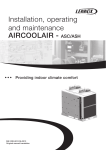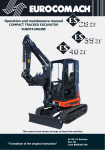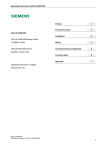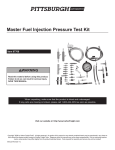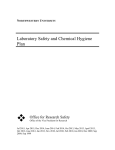Download Owners Manual & Breakdown - Ppe- pressure - washer
Transcript
9 HP pressure washer Model 97553 Set up, Operating, and Servicing Instructions Danger Using an engine indoors CAN KILL YOU IN MINUTES. Engine exhaust contains carbon monoxide. This is a poison you cannot see or smell. NEVER use inside a home or garage, EVEN IF doors and windows are open. Only use OUTSIDE and far away from windows, doors, and vents. Diagrams within this manual may not be drawn proportionally. Due to continuing improvements, actual product may differ slightly from the product described herein. Distributed exclusively by Harbor Freight Tools®. 3491 Mission Oaks Blvd., Camarillo, CA 93011 Visit our website at: http://www.harborfreight.com Read this material before using this product. Failure to do so can result in serious injury. Save this manual. Copyright© 2008 by Harbor Freight Tools®. All rights reserved. No portion of this manual or any artwork contained herein may be reproduced in any shape or form without the express written consent of Harbor Freight Tools. For technical questions or replacement parts, please call 1-800-444-3353. Contents Important SAFETY Information���������������������������� 4 SET UP PRECAUTIONS�������������������� 4 OPERATING PRECAUTIONS������������ 5 Vibration Hazard:������������������ 7 Service precautions������������� 7 Refueling:��������������������������������� 8 Basic Specifications������������� 9 Unpacking���������������������������������� 9 Set Up Instructions��������������� 9 Assembly���������������������������������������� 9 If using detergent:������������� 10 Cleaning, Maintenance, and Lubrication Schedule���������� 17 After 20 Operation Hour Break-in Period:���������������� 17 After Every 25 Operation Hours:������������������������������������ 17 After Every 50 Operation Hours:������������������������������������ 17 After Every 100 Operation Hours:�������������� 17 After Every 300 Operation Hours:�������������� 17 Storage����������������������������������������17 Troubleshooting���������������������� 19 General PARTS LIST�������������� 22 General Assembly diagram���������������������������������� 23 Operating Instructions���� 10 Starting the Engine����������������� 10 Pump PARTS LIST��������������������� 24 Checking Engine Oil Level10 Engine diagram���������������������� 11 Checking Fuel Level����������� 12 Checking the Pump Lubricant����������������������������� 12 Start Procedure����������������� 12 Break-in Period�������������������� 12 Equipment Operation��������������� 13 Technical Specifications�� 15 Servicing���������������������������������� 15 Maintenance Procedures����� 15 Engine Oil Change��������������� 15 Air Filter Element Maintenance����������������������� 15 Spark Plug Maintenance�� 16 Fuel Filter Replacement (if equipped)������������������������� 16 SKU 97553 Pump DIAGRAM������������������������� 25 Cylinder head parts list & diagram������������������������������ 26 Crank case parts list & diagram���������������������������������� 27 Crank case cover parts list and diagram����������������� 28 CRANKSHAFT/PISTON PARTS LIST & DIAGRAM���������������������� 29 Gas distribution adjustment system parts list & diagram��������� 30 Starter subassembly parts list & diagram��������� 31 For technical questions, please call 1-800-444-3353. Page 2 Diversion Assembly parts list & diagram���������������������� 32 Carburetor parts list & diagram���������������������������������� 33 Flywheel/coil assembly parts list & diagram��������� 34 Control system parts list & diagram���������������������� 35 Air cleaner parts list & diagram���������������������������������� 36 Muffler parts list & diagram���������������������������������� 37 Fuel tank parts list & diagram���������������������������������� 38 Limited 1 year / 90 Day warranty������������������������������ 39 Emission Control System Warranty������������������������������ 39 SKU 97553 For technical questions, please call 1-800-444-3353. Page 3 Save This Manual Notice NOTICE is used to address practices not related to personal injury. Keep this manual for the safety warnings and precautions, assembly, operating, inspection, maintenance and cleaning procedures. Write the product’s serial number in the back of the manual near the assembly diagram (or month and year of purchase if product has no number). Keep this manual and the receipt in a safe and dry place for future reference. Caution CAUTION, without the safety alert symbol, is used to address practices not related to personal injury. WARNING! Read all instructions. Failure to follow all instructions listed below may result in fire, serious injury and/or DEATH. The warnings and precautions discussed in this manual cannot cover all possible conditions and situations that may occur. It must be understood by the operator that common sense and caution are factors which cannot be built into this product, but must be supplied by the operator. Important SAFETY Information In this manual, on the labeling, and all other information provided with this product: This is the safety alert symbol. It is used to alert you to potential personal injury hazards. Obey all safety messages that follow this symbol to avoid possible injury or death. DANGER indicates a hazardous situation which, if not avoided, will result in death or serious injury. SAVE THESE INSTRUCTIONS SET UP PRECAUTIONS 1. Gasoline fuel and fumes are flammable, and potentially explosive. Use proper fuel storage and handling procedures. Do not store fuel or other flammable materials nearby. 2. Have multiple ABC class fire extinguishers nearby. 3. This equipment has a spark arresting muffler included. A spark arresting muffler is required by law in California, on some US Forest Service land, and possibly in other areas or situations. 4. Set up and use only on a flat, level, well-ventilated surface. Danger WARNING indicates a hazardous situation which, if not avoided, could result in death or serious injury. WARNING CAUTION, used with the safety alert symbol, indicates a hazardous situation which, if not avoided, could result in minor or moderate injury. Caution SKU 97553 For technical questions, please call 1-800-444-3353. Page 4 5. The work area should have adequate drainage to reduce the possibility of a fall due to slippery surfaces. 6. Wear ANSI-approved safety goggles, heavy-duty work gloves, and dust mask/respirator during set up and use. 7. Use only oil and fuel recommended in the “Specifications” section of this manual. 8. Only use cold Water or pressure washer detergent in this tool. Do not use caustic materials, solvents, flammable materials, or detergents not designed for pressure washers. Use of any such material can cause injury, or damage this tool or personal property. 9. OPERATING PRECAUTIONS 1. NEVER use inside a home or garage, EVEN IF doors and windows are open. Do not dry run this product. Dry running will cause serious damage to the seals. Make sure the water supply used for the Pressure Washer is not dirty or sandy. 10. Prior to starting the Pressure Washer in cold weather, check all of the parts of the unit to make sure ice has not formed. Do not store the unit anywhere that the temperature will fall below 32° F (0° C). SKU 97553 Carbon Monoxide Hazard Using an engine indoors CAN KILL YOU IN MINUTES. Engine exhaust contains carbon monoxide. This is a poison you cannot see or smell. Only use OUTSIDE and far away from windows, doors, and vents. 2. Keep children away from the equipment, especially while it is operating. 3. Do not leave the equipment unattended when it is running. Turn off the equipment (and remove safety keys, if available) before leaving the work area. 4. Wear ANSI-approved safety goggles and hearing protection during use. 5. People with pacemakers should consult their physician(s) before use. Electromagnetic fields in close proximity to a heart pacemaker could cause pacemaker interference or pacemaker failure. Caution is necessary when near the engine’s magneto or recoil starter. For technical questions, please call 1-800-444-3353. Page 5 6. Use only accessories that are recommended by Harbor Freight Tools for your model. Accessories that may be suitable for one piece of equipment may become hazardous when used on another piece of equipment. 7. Do not operate in explosive atmospheres, such as in the presence of flammable liquids, gases, or dust. Gasoline-powered engines may ignite the dust or fumes. 8. Stay alert, watch what you are doing and use common sense when operating a piece of equipment. Do not use a piece of equipment while tired or under the influence of drugs, alcohol or medication. 9. Do not overreach. Keep proper footing and balance at all times. This enables better control of the equipment in unexpected situations. 10. Do not carry the spray handle with your finger on the trigger, whether or not engine is operating. 11. Use this equipment with both hands only. Using equipment with only one hand can easily result in loss of control. 12. Dress properly. Do not wear loose clothing or jewelry. Keep hair, clothing and gloves away from moving parts. Loose clothes, jewelry or long hair can be caught in moving parts. 13. Parts of the Pressure Washer, especially exhaust system components, get very hot during use. Stay clear of hot parts. 14. Do not cover the engine or equipment during operation. SKU 97553 15. Keep the equipment, engine, and surrounding area clean at all times. 16. Use the equipment, accessories, etc., in accordance with these instructions and in the manner intended for the particular type of equipment, taking into account the working conditions and the work to be performed. Use of the equipment for operations different from those intended could result in a hazardous situation. 17. Do not operate the equipment with known leaks in the engine’s fuel system. 18. This product contains or, when used, produces a chemical known to the State of California to cause cancer and birth defects or other reproductive harm. (California Health & Safety Code § 25249.5, et seq.) 19. WARNING: The brass components of this product contain lead, a chemical known to the State of California to cause birth defects (or other reproductive harm). (California Health & Safety code § 25249.5, et seq.) 20. When spills of fuel or oil occur, they must be cleaned up immediately. Dispose of fluids and cleaning materials as per any local, state, or federal codes and regulations. Store oil rags in a bottom-ventilated, covered, metal container. 21. Keep hands and feet away from moving parts. Do not reach over or across equipment while operating. 22. Before use, check for misalignment or binding of moving parts, breakage of parts, and any other condition that may affect the equipment’s operation. If damaged, have the equipment serviced before use. Many ac- For technical questions, please call 1-800-444-3353. Page 6 cidents are caused by poorly maintained equipment. 23. Use the correct equipment for the application. Do not modify the equipment and do not use the equipment for a purpose for which it is not intended. reduce the risk of vibration-related injury: 1. Anyone using vibrating tools regularly or for an extended period should first be examined by a doctor and then have regular medical checkups to ensure medical problems are not being caused or worsened from use. Pregnant women or people who have impaired blood circulation to the hand, past hand injuries, nervous system disorders, diabetes, or Raynaud’s Disease should not use this tool. If you feel any medical or physical symptoms related to vibration (such as tingling, numbness, and white or blue fingers), seek medical advice as soon as possible. 2. Do not smoke during use. Nicotine reduces the blood supply to the hands and fingers, increasing the risk of vibration-related injury. 3. Wear suitable gloves to reduce the vibration effects on the user. 4. Use tools with the lowest vibration when there is a choice between different processes. 5. Include vibration-free periods each day of work. 6. Grip tool as lightly as possible (while still keeping safe control of it). Let the tool do the work. 7. To reduce vibration, maintain the tool as explained in this manual. If any abnormal vibration occurs, stop use immediately. 24. The high pressure water flow can damage the work surface if not used properly. Always test the spray in an open area first. 25. When dispensing detergent, apply the detergent to the cleaning area at low pressure only. Detergent dispensing only works when the spray wand is in the low-pressure position. 26. Injection Hazard. The high pressure water jet produced by this tool can cut skin or cause injury to hands or eyes. Do not allow spray to strike you and do not spray toward people or animals. Do not spray the tool itself or any electrical source. 27. This Pressure Washer is intended for outdoor residential use only. 28. In case of an emergency during use, immediately release the trigger on the spray handle, turn the engine off and then shut off gas supply to the engine. Do not set the spray handle down without turning off the engine. Vibration Hazard: This tool vibrates during use. Repeated or long-term exposure to vibration may cause temporary or permanent physical injury, particularly to the hands, arms and shoulders. To SKU 97553 Service precautions 1. Before service, maintenance, or cleaning: For technical questions, please call 1-800-444-3353. Page 7 2. a.Turn the engine switch to its “OFF” position. ing fittings or having repair work done by a qualified technician. b.Allow the engine to completely cool. 9. c.Then, remove the spark plug wire(s) from the spark plug(s). When the engine is running, do not allow the Pressure Washer to remain idle for more than two minutes. If allowed to remain idle, the water in the unit will heat up, possibly causing damage to the Pressure Washer. Keep all safety guards in place and in proper working order. Safety guards include muffler, air cleaner, mechanical guards, and heat shields, among other guards. 3. Do not alter or adjust any part of the equipment or its engine that is sealed by the manufacturer or distributor. Only a qualified service technician may adjust parts that may increase or decrease governed engine speed. 4. Wear ANSI-approved safety goggles, heavy-duty work gloves, and dust mask/respirator during use and service. 5. 6. 7. 8. Keep the high pressure hose connected to the pressure washer and spray Gun while the system is pressurized. Disconnecting the pressure hose while the unit is pressurized is dangerous, and may cause injury. Do not allow the high pressure hose to come in contact with any hot part of the unit. The hose might be damaged, possibly causing it to burst or leak under high pressure. Maintain labels and nameplates on the equipment. These carry important information. If unreadable or missing, contact Harbor Freight Tools for a replacement. If water is leaking out of the Pressure Washer immediately turn off the unit. Unplug the Pressure Washer, and discharge all pressure before tighten- SKU 97553 10. Have the equipment serviced by a qualified repair person using only identical replacement parts. This will ensure that the safety of the equipment is maintained. Do not attempt any service or maintenance procedures not explained in this manual or any procedures that you are uncertain about your ability to perform safely or correctly. 11. Store equipment out of the reach of children. 12. Follow scheduled engine and equipment maintenance. Refueling: 1. Do not smoke, or allow sparks, flames, or other sources of ignition around the equipment, especially when refuelling. 2. Do not refill the fuel tank while the engine is running or hot. 3. Do not fill fuel tank to the top. Leave a little room for the fuel to expand as needed. 4. Refuel in a well-ventilated area only. Save these instructions. For technical questions, please call 1-800-444-3353. Page 8 Basic Specifications Fuel Engine Oil Type 86+ octane unleaded gasoline Capacity .95 Gallons Type SAE 10W 30 above 32° F 5W30 at 32° F or below Capacity .63 Quarts Pump Oil 16.9 oz. SAE 75W90 Engine Speed 3,600 RPM Engine Family 6CGP.2702GA Tire Inflation 30 PSI (cold) Water Flow 4 GPM Maximum Pressure 3,200 PSI Set Up Instructions Read the entire Important Safety Information section at the beginning of this manual including all text under subheadings therein before set up or use of this product. Risk of accidental starting; resulting in serious personal injury. Turn the Power Switch of the equipment to its “OFF” position, wait for the engine to cool, and unplug the spark plug wire(s) before assembling or making any adjustments to the equipment. WARNING Note: Additional specifications found in the Technical Engine Specifications chart in this manual. The emission control system for this engine is warranted for standards set by the U.S. Environmental Protection Agency and by the California Air Resources Board (also known as CARB). For warranty information, refer to the last pages of this manual. At high altitudes, the engine’s carburetor, governor (if so equipped), and any other parts that control the fuel-air ratio will need to be adjusted by a qualified mechanic to allow efficient high-altitude use and to prevent damage to the engine and any other devices used with this product. Unpacking When unpacking, check to make sure that the item is intact and undamaged. If any parts are missing or broken, please call Harbor Freight Tools at the number shown on the cover of this manual as soon as possible. SKU 97553 Note: For additional information regarding the parts listed in the following pages, refer to the Assembly Diagram near the end of this manual. Assembly 1. This equipment has a spark arresting muffler included. A spark arresting muffler is required by law in California, on some US Forest Service land, and possibly in other areas or situations. 2. Attach the Handle (15) onto the Frame (18) with the Handle Bolt (16) and Nut (17). 3. Attach the Hose (19) to the Hose Connection on the unit. (See picture on the next page.) 4. Pull the Collar at the end of the hose back and attach the Gun (20) to the hose. 5. Screw the Wand (21) onto the Gun and secure with the grommet. For technical questions, please call 1-800-444-3353. Page 9 6. Choose the right Nozzle (5) for the job. Pull back the quick connect collar and push the Nozzle onto the end of the Wand. Make sure the quick connect collar locks the Nozzle in place. • Red Nozzle - direct spray stream. This Nozzle should only be used on hard surfaces such as concrete or metal. This Nozzle can damage wood. • Yellow Nozzle - 15° spray range. This Nozzle is used to clean small areas. • Green Nozzle - 25° spray range. This Nozzle can be used to clean larger areas. • White Nozzle - 40° spray range. This Nozzle can be used to clean very large areas. . • Black Nozzle - This Nozzle is used with pressure washer detergent. Detergent Inlet Connection Pressure Regulator Knob minimum of five gallons of clean, cold water per minute at 20 PSI. Only use a hose that is rated to meet this capacity. If using detergent: 8. Read detergent directions. Connect one end of the Detergent Inlet Hose (8) to the Detergent Inlet Connection, and the other end into the container holding the detergent. Only use detergents specified for use with Pressure Washers. The Pressure Washer will draw one gallon of detergent for every seven gallons of water. Only use the Black (low pressure) Nozzle when spraying detergents. Operating Instructions Read the entire Important Safety Information section at the beginning of this manual including all text under subheadings therein before set up or use of this product. Starting the Engine Inspect engine and equipment looking for damaged, loose, and missing parts before set up and starting. If any problems are found, do not use equipment until fixed properly. Checking Engine Oil Level Hose Connection 7. Water Inlet Connection Connect the water supply to the Water Inlet Connection. The water source must be able to provide a SKU 97553 CAUTION! Your Warranty is VOID if the engine’s crankcase is not properly filled with oil before each use. Before each use, check the oil level. Do not run the engine with low or no engine oil. Running the engine with no or For technical questions, please call 1-800-444-3353. Page 10 COMPONENTS & CONTROL LOCATIONS Engine diagram 2. COMPONENTS & CONTROL LOCATIONS THROTTLE LEVER IGNITION SWITCH MUFFLER STARTER GRIP SPARK PLUG RECOIL STARTER AIR CLEANER CHOKE LEVER FUEL VALVE LEVER FUEL FILLER CAP FUEL TANK OIL DRAIN PLUG OIL FILLER CAP/DIPSTICK SKU 97553 For technical questions,3 please call 1-800-444-3353. Page 11 low engine oil WILL permanently damage the engine. Checking or Replacing the Pump Lubricant 1. Clean the Oil Filler Cap and the area around it. 1. 2. Remove the Oil Filler Cap/Dipstick. Read the engine service manual for the proper way to check the oil level. To check the pump oil level, look at the Oil Sight (2A). The oil is at the proper level when the level is in the middle of the Oil Sight. 2. Remove the Oil Inlet Plug (9A) by turning it counterclockwise. Add oil as required. The total amount needed is 16.9 oz. of SAE 10W-30 oil. 3. To remove the oil from the pump remove the Oil Drain Plug (5A). 4. Make sure both the Oil Inlet Plug and the Oil Drain Plug are properly installed. 3. 4. If the oil level is low, add the proper type and weight. See information below. Oil type: 32° F or above = SAE 10W-30 Below 32° F = SAE 5W-30. Replace the Oil Filler Cap. CAUTION! Do not run the engine with too little or too much oil. The engine will be permanently damaged. Start Procedure Before starting the engine: a.Follow the Set Up Instructions to prepare the equipment. b.Inspect the equipment and engine. c.Fill the engine with the proper amount and type of both fuel and oil. d.Read the Equipment Operation section that follows. Checking Fuel Level Warning! To prevent fire, shut the engine off and wait for it to cool before adding fuel. Do not smoke. 1. Clean the Fuel Filler Cap and the area around it. 1. To Check the fuel level, unscrew and remove the Fuel Filler Cap. 2. Mix fuel stabilizer (not included) with 86 octane (or better) unleaded gasoline according to fuel stabilizer directions. 1. Turn the fuel valve lever to its “OPEN” position. 2. Turn the ignition switch to its ON or RUN position. 3. Fill the Fuel Tank to about 1 inch under the lip of the gasoline tank with the stabilized unleaded gasoline mixture. 3. Then, turn the engine choke lever to its “CHOKE” position. Set the choke lever in the “RUN” position when starting a warm engine. 4. Then replace the Fuel Filler Cap. 4. Grasp the starter handle, and pull slowly until resistance is felt. While holding the handle, allow the starter rope to rewind slowly. Then, pull the REV 09d SKU 97553 For technical questions, please call 1-800-444-3353. Page 12 Never direct spray Danger from the pressure washer at a person or animal. The water stream could cause serious injury. starter handle with a rapid, full arm stroke. Once again while holding the handle, allow the rope to rewind slowly. Repeat as necessary, until the engine starts. 5. 6. After the engine starts and warms up, slowly move the choke lever to its “RUN” position. Caution IMPORTANT: Allow the engine to run at no load for five minutes with no load after each start-up so that the engine can stabilize. Caution Only use the pressure washer on surfaces able to withstand the force of the spray. Only use the Black Nozzle when using pressure washer detergent. The power of the other Nozzles will propel mist back at the operator and can imbed the detergent into the surface. Break-in Period 1. Breaking-in the engine will help to ensure proper equipment and engine operation. 2. The operational break-in period will last about 3 hours of use. During this period: • Do not apply a heavy load to the equipment. 2. Pull back the quick connect collar and push the Nozzle onto the end of the Wand. Make sure the quick connect collar locks the Nozzle in place. 3. Turn the water supply on and hold down the Trigger to start the stream. Be aware that when it is first started, the gun will kick. 4. It is best to start at a low pressure setting and adjust the pressure upwards. Test spray the edge of the surface to be cleaned first to make sure that the stream is not too strong for the surface. If the stream damages the surface turn the Pressure Regulator Knob towards the “—” to reduce the pressure. Moving further away from the surface being cleaned will also reduce the pressure being applied to the surface. If the stream is still too strong. Turn the water supply off, turn the engine off, discharge the excess pressure from the gun by squeezing the Trigger, and change to a lower pressure Nozzle. • Do not operate the engine at its maximum speed. 3. The maintenance break-in period will last about 20 hours of use. After this period: • Change the engine oil. Under normal operating conditions subsequent maintenance follows the schedule explained in the Maintenance and Servicing section. Equipment Operation 1. Choose the Nozzle that best meets the needs of the job. Only use the Nozzles on surfaces capable of withstanding the force of the spray SKU 97553 For technical questions, please call 1-800-444-3353. Page 13 5. To increase the pressure, turn the Pressure Regulator Knob towards the “+” symbol. 6. Hold the Wand at about a 45° angle when cleaning; spraying the surface directly could embed dirt into the surface (especially with the high pressure Nozzles). Spray at a distance of about three to five feet. • Clean vertical and sloped surfaces from the top down. • When cleaning horizontal surfaces, occasionally use the stream to clear the area of excess water to improve safety. 11. If Pressure Washer detergent has been used for the job, run clean water through the system to eliminate detergent residue. 12. To prevent accidents, turn off the engine, wait for it to cool, and disconnect its spark plug wire after use. Drain all water out of the unit, clean external parts with clean cloth, then store the equipment out of children’s reach according to the Storage instructions in this manual. Caution Never allow the Pressure Washer to idle, without the Trigger depressed, for more than two minutes. The water will heat up and could damage the Pressure Washer. 7. Hold the Trigger down and move the Wand back and forth slowly and steadily to pressure wash the surface. Take special care when spraying surfaces made of two different materials (brick and mortar, for example), to not damage the softer of the two materials during pressure washing. 8. If the surface is streaked or uneven at the end of a job, switch to a Nozzle that has a wider spray pattern to blend the affected area. 9. When finished; release the Trigger on the spray handle, turn the water supply off, turn the engine’s power switch “OFF” and then shut off gas supply to the engine. 10. Squeeze the Trigger to release excess pressure. SKU 97553 For technical questions, please call 1-800-444-3353. Page 14 Technical Specifications Engine Type Battery Required Bore x Stroke Displacement Compression Ratio Rotation viewed from PTO (power takeoff - the output shaft) Type Fuel Capacity Type SAE Engine Oil Capacity Type Spark Plug Gap Intake Exhaust Idle Maximum Valve Clearance Speed Maintenance Procedures Many maintenance procedures, including any not detailed in this manual, will need to be performed by a qualified technician for safety. If you have any doubts about your ability to safely service the equipment or engine, have a qualified technician service the equipment instead. Single Cylinder 4 stroke OHV 12V 18Ah 77mm x 58mm 270cc 8.2:1 Counterclockwise 86+ octane unleaded gasoline 0.95 Gallons 10W30 above 32° F 5W30 at 32° F or below 0.63 Quarts F7RTC or NGK F7TC 0.028 - 0.031” 0.15 ± 0.02 mm 0.20 ± 0.02 mm 1,400 ± 150 RPM 3600 RPM Servicing Risk of serious personal injury from accidental starting. Turn the Power Switch of the equipment to its “OFF” position, wait for the engine to cool, and unplug the spark plug wire(s) before performing any inspection, maintenance, or cleaning procedures. Engine Oil Change CAUTION! Oil is very hot during operation and can cause burns. Wait for engine to cool before changing oil. 1. Place a drain pan (not included) underneath the crankcase’s drain plug. 2. Remove the drain plug and, if possible, tilt the crankcase slightly to help drain the oil out. Recycle used oil. 3. Replace the drain plug and tighten it. 4. Refill the oil to the proper level following the instructions under the Starting the Engine section. WARNING Damaged equipment can fail, causing serious personal injury. Do not use damaged equipment. If abnormal noise, vibration, or excess smoking occurs, have the problem corrected before further use. SKU 97553 Air Filter Element Maintenance 1. The air cleaner cover is held in place by a wing nut or clamps. Remove it. 2. Remove the air filter element. 3. Cleaning: a.For “paper” filter elements: To prevent injury from dust and debris, wear ANSI-approved safety goggles, NIOSH-approved dust mask/respirator, and heavy-duty work gloves. In a well-ventilated area away from bystanders, use pressurized air to blow dust out of the air filter. For technical questions, please call 1-800-444-3353. Page 15 If this does not get the filter reasonably clean, replace it. b.For foam filter elements: Wash the element in warm water and mild detergent several times. Rinse. Squeeze out excess water and allow it to dry completely. Soak the filter in lightweight oil briefly, then squeeze out the excess oil. 4. Install the new filter or the cleaned filter. Secure the Air Cleaner Cover before use. Spark Plug Maintenance 6. Apply dielectric spark plug boot protector (not included) to the end of the spark plug and reattach the wire securely. Fuel Filter Replacement (if equipped) WARNING! Risk of fire or explosion. Replace the fuel filter in a well-ventilated area away from ignition sources. Do not smoke. 1. Wait for engine to cool completely before proceeding. 2. Wear protective gear including, ANSIapproved safety goggles, NIOSHapproved dust mask/respirator, and nitrile gloves. 1. Disconnect spark plug wire from end of plug. Clean out debris from around spark plug. 2. Using a spark plug wrench, remove the spark plug. 3. Close fuel valve leading from gas tank completely. 3. Inspect the spark plug: If the electrode is oily, clean it using a clean, dry rag. If the electrode has deposits on it, polish it using emery paper. If the white insulator is cracked or chipped, the spark plug needs to be replaced. 4. Take note of the fuel filter’s orientation. 5. Place a suitable container under the fuel filter. 6. Disconnect the fuel lines leading to and from the fuel filter and allow fuel to drain onto the container. When installing a new spark plug, adjust the plug’s gap to the specification on the Technical specification chart. Do not pry against the electrode, the spark plug can be damaged. 7. Install new fuel filter in the same orientation. Make sure to properly secure both fuel lines. 8. Clean up and properly dispose of all fuel. 9. Wait for at least one hour before use to allow all residual fuel vapors to dissipate. To prevent fire, do not start the engine while the smell of fuel hangs in the air. Remember to open the fuel valve before restarting the engine. It may take a little longer than usual to start the engine be- 4. 5. Install the new spark plug or the cleaned spark plug into the engine. Gasket-style: Finger-tighten until the gasket contacts the cylinder head, then about 1/2-2/3 turn more. Non-gasket-style: Finger-tighten until the plug contacts the head, then about 1/16 turn more. SKU 97553 For technical questions, please call 1-800-444-3353. Page 16 cause the fuel needs to refill the fuel line and new filter. After Every 300 Operation Hours: a.Clean fuel tank and carburetor. b.Clean carbon build-up from combustion chamber. Cleaning, Maintenance, and Lubrication Schedule Note: This maintenance schedule is intended solely as a general guide. If performance decreases or if equipment operates unusually, check systems immediately. The maintenance needs of each piece of equipment will differ depending on factors such as duty cycle, temperature, air quality, fuel quality, and other factors. Storage 1. Wait for engine to cool, then clean engine with clean cloth. 2. When the equipment is to remain idle for longer than 20 days, prepare the engine for storage as follows: a.Change engine oil and empty fuel tank. Note: These procedures are in addition to the regular checks and maintenance explained as part of the regular operation of the engine and equipment. b.Either leave fuel tank empty or refill fuel tank with fresh unleaded gasoline mixed with a fuel stabilizer intended for long term engine storage (not included). After filling, run engine for about 5-10 minutes to circulate the treated gasoline through the carburetor. Wait for engine to cool before proceeding. After 20 Operation Hour Break-in Period: a.Change engine oil. After Every 25 Operation Hours: c. Clean out area around spark plug. Remove spark plug and pour one tablespoon of engine oil into cylinder through spark plug hole. a.Clean/replace air filter element. b.Inspect/clean spark plug. c. Blow out water filters. d.Replace spark plug, but leave spark plug wire disconnected. After Every 50 Operation Hours: e.Pull recoil starter to distribute oil in cylinder. Stop after one or two revolutions when you feel the piston start the compression stroke (when you start to feel resistance). a.Change engine oil. b.Replace fuel filter (if equipped). After Every 100 Operation Hours: a.Replace spark plug. f. Disconnect battery cables (if equipped). b.Replace air filter element. Note: All maintenance procedures scheduled for 25, 50, and 100 operation hours should be performed at least yearly. SKU 97553 3. Apply a thin coat of rust preventive oil to all metal parts. 4. Cover and store in a dry, well-ventilated area out of reach of children. For technical questions, please call 1-800-444-3353. Page 17 5. Before starting the engine after storage, keep in mind that untreated gasoline will deteriorate quickly. Drain the fuel tank and change to fresh fuel if untreated gasoline has been sitting for a month, if treated gasoline has been sitting beyond the fuel stabilizer’s recommended time period, or if the engine does not start properly. SKU 97553 For technical questions, please call 1-800-444-3353. Page 18 Troubleshooting Problem Engine will not start Possible Causes Probable Solutions Fuel Related: 1. No fuel in tank or fuel valve closed. 2. Choke not in start position, especially with cold engine. 3. Low quality or deteriorated, old gasoline. 4. Carburetor not primed. Fuel Related: 1. Fill fuel tank and open fuel valve. 2. Move choke to start position if engine is cold. 3. Use only fresh 86+ octane unleaded gasoline. 4. Prime carburetor by pressing priming bulb (if equipped). 5. Dirty fuel passageways blocking 5. Clean out passageways using fuel flow. fuel additive. Heavy deposits may require further cleaning. 6. Carburetor needle stuck. Fuel can 6. Gently tap side of carburetor float be smelled in the air. chamber with screwdriver handle. 7. Too much fuel in chamber. This can 7. Turn choke to run position. be caused by the carburetor needle Remove spark plug and pull the sticking. start handle several times to air out the chamber. Reinstall spark plug and set choke to start position. Ignition (spark) Related: 1. Spark plug wire not connected securely. 2. Spark plug electrode wet or dirty. 3. Incorrect spark plug gap. 4. Spark plug wire broken. 5. Incorrect spark timing or faulty ignition system. Ignition (spark) Related: 1. Connect spark plug wire properly. Compression Related: 1. Cylinder not lubricated. Problem after long storage periods. Compression Related: 1. Pour tablespoon of oil into spark plug hole. Crank engine a few times and try to start again. 2. Tighten spark plug. If that does not work, replace spark plug. If problem persists, may have head gasket problem, see #3. 3. Tighten head. If that does not remedy problem, replace head gasket. 4. Adjust valve clearance. If that does not work, clean or replace valves/ tappets. 2. Loose or broken spark plug. (Hissing noise will occur when trying to start.) 3. Loose cylinder head or damaged head gasket. (Hissing noise will occur when trying to start.) 4. Engine valves or tappets misadjusted or stuck. 2. Clean spark plug. 3. Correct spark plug gap. 4. Replace spark plug wire. 5. Have qualified technician diagnose/ repair ignition system. Follow all safety precautions whenever diagnosing or servicing the equipment or engine. SKU 97553 For technical questions, please call 1-800-444-3353. Page 19 Troubleshooting Problem Engine misfires Possible Causes 1. Spark plug wire loose. 2. Incorrect spark plug gap or damaged spark plug. 3. Defective spark plug wire. 4. Old or low quality gasoline. 5. Incorrect compression. Engine stops suddenly 1. Low oil shutdown. 2. Fuel tank empty or full of impure or low quality gasoline. 3. Defective fuel tank cap creating vacuum, preventing proper fuel flow. 4. Faulty magneto. Engine knocks 1. Old or low quality gasoline. 2. Engine overloaded. 3. Incorrect spark timing, deposit buildup, worn engine, or other mechanical problems. Engine backfires 1. Impure or low quality gasoline. 2. Engine too cold. 3. Intake valve stuck or overheated engine. Does not produce high pressure 1. Diameter of water supply hose too small. 2. Water supply is restricted. 3. Not enough water supply. Probable Solutions 1. Check wire connections. 2. Re-gap or replace spark plug. 3. Replace spark plug wire. 4. Use only fresh 86+ octane unleaded gasoline. 5. Diagnose and repair compression. (Use Engine will not start: Compression Related section.) 1. Fill engine oil to proper level. Check engine oil before EVERY use. 2. Fill fuel tank with fresh 86+ octane unleaded gasoline. 3. Test/replace fuel tank cap. 4. Have qualified technician service magneto. 1. Fill fuel tank with fresh 86+ octane unleaded gasoline. 2. Do not exceed equipment’s load rating. 3. Have qualified technician diagnose and service engine. 1. Fill fuel tank with fresh 86+ octane unleaded gasoline. 2. Use cold weather fuel and oil additives to prevent backfiring. 3. Have qualified technician diagnose and service engine. 1. Replace hose with a ¾ Inch hose. 2. Check water supply hose for kinks, leaks, or blockage. 3. Open water faucet all the way. Follow all safety precautions whenever diagnosing or servicing the equipment or engine. SKU 97553 For technical questions, please call 1-800-444-3353. Page 20 Troubleshooting Problem Output pressure varies Possible Causes 1. Not enough water supply. 2. Water inlet screen is clogged. 3. Nozzle is clogged. 4. Nozzle has mineral build up. No intake of chemicals. 1. Chemical hose not properly inserted into unit. 2. Tube cracked or split. 3. Wrong Nozzle. 4. Injector turned off. 5. Injection tube strainer clogged. 6. Nozzle blocked. 7. Dried chemicals in injector. Probable Solutions 1. Check water supply hose for kinks, leaks, or blockage. Open faucet all the way. 2. Remove inlet screen and rinse out. 3. Remove Nozzle and clean. 4. Remove Nozzle and clean with vinegar. 1. Push firmly into Detergent Connection. 2. Replace tube. 3. Switch to black Nozzle. 4. Turn collar counterclockwise. 5. Clean strainer. 6. Clean Nozzle. 7. Dissolve by running warm water through the injection tube. Follow all safety precautions whenever diagnosing or servicing the equipment or engine. PLEASE READ THE FOLLOWING CAREFULLY The manufacturer and/or distributor has provided the parts list and assembly diagram in this manual as a reference tool only. Neither the manufacturer or distributor makes any representation or warranty of any kind to the buyer that he or she is qualified to make any repairs to the product, or that he or she is qualified to replace any parts of the product. In fact, the manufacturer and/ or distributor expressly states that all repairs and parts replacements should be undertaken by certified and licensed technicians, and not by the buyer. The buyer assumes all risk and liability arising out of his or her repairs to the original product or replacement parts thereto, or arising out of his or her installation of replacement parts thereto. SKU 97553 For technical questions, please call 1-800-444-3353. Page 21 General PARTS LIST Part Description 1 Gun & Hose Holder 2 Washer 3 Nut 4 Grommet 5 Nozzle 6 Safety Warnings 7 Filter 8 Detergent Inlet Hose 9 Bolt 10 Lock Washer 11 Pump Assembly 12 Engine 13 Key 14 Thermal Protection Valve 15 Handle 16 Handle Bolt 17 Nut 18 Frame 19 Hose 20 Gun 21 Wand 22 Pad 23 Washer 24 Nut 25 Engine Bolt 26 Lock Washer 27 Washer 28 Nut 29 Lock Washer 30 Nut 31 Lock Washer 32 Washer 33 Axle 34 Clip 35 Wheel 36 Washer 37 Nut SKU 97553 Record Product’s Serial Number Here: Note: If product has no serial number, record month and year of purchase instead. Note: Some parts are listed and shown for illustration purposes only, and are not available individually as replacement parts. For technical questions, please call 1-800-444-3353. Page 22 General Assembly diagram SKU 97553 For technical questions, please call 1-800-444-3353. Page 23 Pump PARTS LIST Part Description Pump PARTS LIST Part Description Pump PARTS LIST Part Description 1A Screw 37A Nut 95A Valve Cage 2A Oil Gauge 38A Connecting Rod 96A O-ring 3A Oil Gauge Gasket 39A Pin 97A Valve Plug 4A Oil Drain Plug Gasket 62A O-ring 98A Outlet Plug 5A Oil Drain Plug 63A Stop Valve 99A Inlet Plug 6A Crank Case Cover 64A Spring 100 Bolt 7A O-ring 65A O-ring B Plunger Assembly 8A Cover, Oil Inlet Plug 66A Outlet Connector C Plunger Sealing Set 9A Oil Inlet Plug 67A O-ring D 10A O-ring 68A Outlet Banjo Bolt Unloader Valve Assembly 11A Crank Case 69A O-ring E 12A Screw 70A Inlet T-connector Pressure Regulator Assembly 13A Oil Seal 71A O-ring F Water Inlet Assembly 14A Flange 72A Inlet Connector G 15A O-ring 73A Swivel Nut Detergent Injector Assembly 16A Needle Bearing 74A O-ring H Stop Valve Assembly 17A Crankshaft 75A Water Filter 18A Ball Bearing 76A Adapter 19A Clip 77A O-ring 20A O-ring 78A Inlet Banjo Bolt 21A Crankshaft Cover 79A Water Injection Tube 22A Screw 80A QD Body 23A Oil Seal Plunger 81A Ball 24A Locating Ring 82A Spring 25A O-ring 83A Clip 26A Low Pressure Seal 84A Collar 27A Compaction Ring 85A O-ring 28A Gasket 86A Soap Suction Nozzle 29A High Pressure Seal 87A O-ring 30A Supporting Ring 88A Ball 31A Plunger Guide 89A Spring 32A Stop Ring 90A Manifold Head 33A Backup Ring 91A O-ring 34A O-ring 92A Seat 35A Ceramic Pipe 93A Valve Plate 36A Washer 94A Spring When ordering replacement parts from this list, the “A” suffix must be included in order to get the correct part. SKU 97553 For technical questions, please call 1-800-444-3353. Page 24 Pump DIAGRAM Note: When ordering replacement parts from this diagram, the “A” suffix must be included in order to get the correct part. SKU 97553 For technical questions, please call 1-800-444-3353. Page 25 Cylinder head parts list & diagram Part # Description Qty 1B Cylinder Head Assembly 1 2B Intake Valve Guide 1 3B Exhaust Valve Guide 1 4B Valve Guide Clip 1 5B Cover 1 6B Packing 1 7B Breathing Tube 1 8B Spark Plug 1 9B Cylinder Gasket 1 10B Muffler Gasket 1 11B Pin 2 12B Bolt 6x14 4 13B Bolt 8x55 4 14B Intake Bolt 2 15B Exhaust Bolt 2 16B Intake Valve Seat 1 17B Exhaust Valve Seat 1 18B Cylinder Head 1 Note: When ordering replacement parts from this diagram, the “B” suffix must be included in order to get the correct part. Note: Some parts are listed and shown for illustration purposes only, and are not available individually as replacement parts. SKU 97553 For technical questions, please call 1-800-444-3353. Page 26 Crank case parts list & diagram Part # Description Qty Part # Description Qty 1C Crank Case Assembly 1 13C Ball Bearing 1 2C Oil Level Switch 1 14C Oil Seal 1 3C Governor Gear Assembly 1 15C O-ring 1 4C Weight 2 16C Nut 1 5C Governor Gear 1 17C Washer 1 6C Weight Pin 2 18C R-pin 1 7C Slider 1 19C Bolt 6x12 3 8C Shaft Arm 1 20C Shaft 1 9C Drain Plug Bolt 2 21C Governor Assembly 1 10C Washer 2 22C Oil Alarm 1 11C Washer 2 23C Bolt 1 12C Clip 1 Note: When ordering replacement parts from this diagram, the “C” suffix must be included in order to get the correct part. Note: Some parts are listed and shown for illustration purposes only, and are not available individually as replacement parts. SKU 97553 For technical questions, please call 1-800-444-3353. Page 27 Crank case cover parts list and diagram Part # Description Qty 1D Bolt 6 2D Oil Stick 1 3D Packing 2 4D Cover 1 5D Oil Seal 1 6D Bearing 1 7D Pin 2 8D Oil Filler Cap 1 9D Packing Case Cover 1 10D Oil Fill Assembly 1 11D Cap Assembly 1 Note: When ordering replacement parts from this diagram, use the suffix “D”. Note: Some parts are listed and shown for illustration purposes only, and are not available individually as replacement parts. SKU 97553 For technical questions, please call 1-800-444-3353. Page 28 CRANKSHAFT/PISTON PARTS LIST & DIAGRAM Part # Description Qty 1E Ring Set 1 2E Piston 1 3E Pin 1 4E Rod Assembly 1 5E Crankshaft Assembly 1 6E Bolt 2 7E Clip 2 8E Timing Gear 1 9E Gear 1 10E Crankshaft 1 11E First Ring 1 12E Second Ring 1 13E Oil Ring 2 14E Bushing Ring 1 15E Connecting Rod 1 16E Connecting Rod Cover 1 17E Key 1 Note: When ordering replacement parts from this diagram, use the suffix “E”. Note: Some parts are listed and shown for illustration purposes only, and are not available individually as replacement parts. SKU 97553 For technical questions, please call 1-800-444-3353. Page 29 Gas distribution adjustment system parts list & diagram Part # Description Qty Part # Description Qty 1F Nut 2 14F Camshaft Assembly 1 2F Rocker Arm 2 15F Reducer Pin 1 3F Valve Rocker 2 16F Reducer 1 4F Pivot Bolt 2 17F Matching Block Pin 2 5F Plate Assembly 1 18F Matching Block 1 6F Block Guide 2 19F Flying Block Pin 1 7F Push Rod Guide 1 20F Spring Pin 1 8F Push Rod 2 21F Flying Block Spring 1 9F Valve Lifter 2 22F Flying Block 1 10F Rotator Valve 2 23F Camshaft 1 11F Valve Spring Retainer 2 24F Exhaust Valve 1 12F Valve Spring 2 25F Intake Valve 1 13F Guide Seal 1 Note: When ordering replacement parts from this diagram, use the suffix “F”. Note: Some parts are listed and shown for illustration purposes only, and are not available individually as replacement parts. SKU 97553 For technical questions, please call 1-800-444-3353. Page 30 Starter subassembly parts list & diagram Part # Description Qty 1G Starter Assembly 1 2G Set Screw 1 3G Ratchet Guide 1 4G Friction Spring 1 5G Starter Ratchet 2 6G Return Spring 2 7G Recoil Starter Reel 1 8G Recoil Starter Spring 1 9G Recoil Starter Knob 1 10G Fan Cover 1 11G Rope 1 12G Bolt 6x8 3 13G Bolt 6x10 4 14G Fan Cover 1 15G Switch Assembly 1 16G Recoil Starter 1 17G Fan Cover 1 18G Stop Switch Assembly 1 Note: When ordering replacement parts from this diagram, use the suffix “G”. Note: Some parts are listed and shown for illustration purposes only, and are not available individually as replacement parts. SKU 97553 For technical questions, please call 1-800-444-3353. Page 31 Diversion Assembly parts list & diagram Part # Description Qty 1H Bolt 6x20 1 2H Side Plate 1 3H Bolt 6x8 2 4H Shroud 1 5H Side Plate 1 6H Grommet 1 Note: When ordering replacement parts from this diagram, use the suffix “H”. Note: Some parts are listed and shown for illustration purposes only, and are not available individually as replacement parts. SKU 97553 For technical questions, please call 1-800-444-3353. Page 32 Carburetor parts list & diagram Part # Description Qty Part # Description Qty 1J Carburetor Assembly 1 19J Lever Spring 1 2J Carburetor 1 20J Setting Plate 1 3J Main Nozzle 1 21J Screw 3x8 2 4J Main Jet 1 22J Jet Set 1 5J Float Valve 1 23J Pilot Jet Set 1 6J Valve Set Spring 1 24J Choke Lever Assembly 1 7J Float 1 25J Choke Lever 1 8J Float Pin 1 26J Choke Lever Pin 1 9J Oil Cup Gasket 1 27J Choke Set 1 10J Oil Cup 1 28J Screw 1 11J Gasket Bolt 1 29J Screw Spring 1 12J Bolt 1 30J Throttle Stop Screw 1 13J Drain Bolt 1 31J Air Cleaner 1 14J Drain Bolt Gasket 1 32J Carburetor Packing 1 15J Fuel Strainer Cup 1 33J Carburetor Insulation 1 16J Fuel Strainer Cup Packing 1 34J Packing 1 17J Fuel Packing 1 35J Throttle Valve 1 18J Lever 1 Note: When ordering replacement parts from this diagram, use the suffix “J”. SKU 97553 For technical questions, please call 1-800-444-3353. Page 33 Flywheel/coil assembly parts list & diagram Part # Description Qty 1K Ignition Assembly 1 2K Ignition Coil 2 3K Noise Suppression Cap Assembly 1 4K Stop Switch Cord 1 5K Bolt 6x30 2 6K Flywheel Cover 1 7K Charge Coil Assembly 1 8K Cooling Fan 1 9K Starter Pulley 1 10K Nut 1 11K Flywheel 1 12K Charge Coil 1 13K Bolt 6x35 2 14K Cord Clamp 1 15K Bolt 6x8 1 Note: When ordering replacement parts from this diagram, use the suffix “K”. Note: Some parts are listed and shown for illustration purposes only, and are not available individually as replacement parts. SKU 97553 For technical questions, please call 1-800-444-3353. Page 34 Control system parts list & diagram Part # Description Qty Part # Description Qty 1M Bolt 2 12M Washer 1 2M Governor Spring 1 13M Retainer Assembly 1 3M Bolt 1 14M Spring 1 4M Governor Arm 1 15M Screw 5x35 5M Nut 1 16M Cable Return Spring 1 6M Throttle Return Spring 1 17M Control Handle 1 7M Governor Rod 1 18M Screw 5x25 1 8M Control Assembly 1 19M Back Plate 1 9M Nut 1 20M Screw 4x6 1 10M Fixing Plate 1 21M Locking Ring 1 11M Washer 1 22M Clip 1 Note: When ordering replacement parts from this diagram, use the suffix “M”. Note: Some parts are listed and shown for illustration purposes only, and are not available individually as replacement parts. SKU 97553 For technical questions, please call 1-800-444-3353. Page 35 Air cleaner parts list & diagram Part # Description Qty Part # Description Qty 1N Air Cleaner Assembly 1 10N Air Cleaner Element Assembly 1 2N Elbow 1 11N Grommet 1 3N Short Collar 2 12N Outer Filter 1 4N Long Collar 2 13N Element 1 5N Elbow Packing 1 14N Noise Silencer 1 6N Bolt 6x20 1 15N Air Cleaner Assembly 1 7N Nut 6mm 2 16N Cover 1 8N Nut 2 17N Screw 2 9N Air Cleaner Cover 1 Note: When ordering replacement parts from this diagram, use the suffix “N”. Note: Some parts are listed and shown for illustration purposes only, and are not available individually as replacement parts. SKU 97553 For technical questions, please call 1-800-444-3353. Page 36 Part # Muffler parts list & diagram Description 1P Muffler 1 2P Nut 8mm 1 3P Muffler Cover 1 4P Screw 5x8 4 5P Muffler Assembly 1 6P Muffler Case 1 Qty Note: When ordering replacement parts from this diagram, use the suffix “P”. Note: Some parts are listed and shown for illustration purposes only, and are not available individually as replacement parts. SKU 97553 For technical questions, please call 1-800-444-3353. Page 37 Fuel tank parts list & diagram Part # Description 1R Clip Tube 2 2R Joint Assembly 1 3R Fuel Tank 1 4R Fuel Filler Assembly 1 5R Fuel Cap Gasket 1 6R Fuel Filter 1 7R Bolt 6x25 1 8R Joint Packing 1 9R Nut 6mm 2 10R Fuel Line 1 11R Fuel Cap 1 12R Fuel Tank Assembly 1 13R Fuel Tank Joint 1 Qty Note: When ordering replacement parts from this diagram, use the suffix “R”. Note: Some parts are listed and shown for illustration purposes only, and are not available individually as replacement parts. SKU 97553 For technical questions, please call 1-800-444-3353. Page 38 Limited 1 year / 90 Day warranty Harbor Freight Tools Co. makes every effort to assure that its products meet high quality and durability standards, and warrants to the original purchaser that for a period of ninety days from date of purchase that the engine/motor, the belts (if so equipped), and the blades (if so equipped) are free of defects in materials and workmanship. Harbor Freight Tools also warrants to the original purchaser, for a period of one year from date of purchase, that all other parts and components of the product are free from defects in materials and workmanship (90 days if used by a professional contractor or if used as rental equipment). This warranty does not apply to damage due directly or indirectly, to misuse, abuse, negligence or accidents, repairs or alterations outside our facilities, normal wear and tear, or to lack of maintenance. We shall in no event be liable for death, injuries to persons or property, or for incidental, contingent, special or consequential damages arising from the use of our product. Some states do not allow the exclusion or limitation of incidental or consequential damages, so the above limitation of exclusion may not apply to you. This warranty is expressly in lieu of all other warranties, express or implied, including the warranties of merchantability and fitness. To take advantage of this warranty, the product or part must be returned to us with transportation charges prepaid. Proof of purchase date and an explanation of the complaint must accompany the merchandise. If our inspection verifies the defect, we will either repair or replace the product at our election or we may elect to refund SKU 97553 the purchase price if we cannot readily and quickly provide you with a replacement. We will return repaired products at our expense, but if we determine there is no defect, or that the defect resulted from causes not within the scope of our warranty, then you must bear the cost of returning the product. This warranty gives you specific legal rights and you may also have other rights which vary from state to state. 3491 Mission Oaks Blvd. • PO Box 6009 • Camarillo, CA 93011 • (800) 444-3353 Emission Control System Warranty California and United States Emission Control Defects Warranty Statement The California Air Resources Board (herein CARB), the United States Environmental Protection Agency (herein EPA), and Harbor Freight Tools (herein HFT) are pleased to explain the emission control system warranty on your 1995 and later Small Off-Road Engine (herein engine). In California, the engine must be designed, built and equipped to meet the State’s stringent anti-smog standards. Elsewhere within the United States, new off-road, spark-ignition engines certified for model year 1997 and later, must meet similar standards set forth by the EPA. HFT must warrant the emission control system on your engine for the periods of time described below, provided there has been no abuse, neglect or improper maintenance of your engine. Your emission control system may include parts such as the carburetor or fuel-injection system, and the ignition system. Also included may be hoses, belts, connectors and other emissionrelated assemblies. Where a warrantable condition exists, HFT will repair your engine at no cost to you including diagnosis, parts and labor. Manufacturer’s Warranty Coverage The 1995 and later engines are warranted for two (2) years. If any emission-related part on your engine is defective, the part will be repaired or replaced by HFT. Harbor Freight Tools Emission Control Defects Warranty Coverage Engines are warranted for a period of two (2) years relative to emission control parts defects, subject to the provisions set forth below. If any emission related part on your engine is defective, the part will be repaired or replaced by HFT. For technical questions, please call 1-800-444-3353. Page 39 Owner’s Warranty Responsibilities • As the engine owner, you are responsible for the performance of the required maintenance listed in your Owner’s Manual. HFT recommends that you retain all receipts covering maintenance on your engine, but HFT cannot deny warranty solely for the lack of receipts or for your failure to ensure the performance of all scheduled maintenance. • As the engine owner, you should, however, be aware that HFT may deny you warranty coverage if your engine or a part has failed due to abuse, neglect, improper maintenance, or unapproved modifications. • You are responsible for shipping your engine to a HFT warranty station as soon as a problem exists. Contact the HFT Customer Service department at the number below to make shipping arrangements. The warranty repairs should be completed in a reasonable amount of time, not to exceed 30 days. If you have any questions regarding your warranty rights and responsibilities, you should contact the Harbor Freight Tools Customer Service Department at 1-800-444-3353. Harbor Freight Tools Emission Control Defects Warranty Provisions 1. Length of Coverage HFT warrants to a first retail purchaser and each subsequent purchaser that the engine is free from defects in materials and workmanship that cause the failure of warranted parts for a period of two (2) years after the date of delivery to the first retail purchaser. 2.No Charge Repair or Replacement Repair or replacement of any warranted part will be performed at no charge to the owner if the work is performed through a warranty station authorized by HFT. For emissions warranty service, contact the HFT Customer Service Department at 1-800-444-3353. 5.Service and Maintenance Component parts which are not scheduled for replacement as required maintenance or are scheduled only for regular inspection to the effect of “repair or replace as necessary” are warranted for the warranty period. Any warranted part which is scheduled for replacement as required maintenance is warranted for the period of time up to the first scheduled replacement point for that part. Any replacement part, provided it is equivalent in durability and performance, may be used in performance of maintenance or repairs. The owner is responsible for commissioning a qualified technician/mechanic to perform all required maintenance, as outlined in the Inspection, Cleaning, and Maintenance section in this manual. 6.Warranted Parts 1) Fuel Metering System i) Carburetor and its internal parts. ii) Fuel pump (if so equipped). iii) Cold start enrichment system. 2)Air Induction System i) Intake pipe/manifold. ii) Air cleaner. 3)Ignition System i) Spark plug. ii) Magneto ignition system. 4)Catalyst System (if so equipped) i) Exhaust pipe stud. ii) Muffler. iii) Catalytic converter (if so equipped). 5) Miscellaneous Items Used in Above Systems i) Vacuum, temperature and time sensitive valves and switches. ii) Hoses, belts, connectors, and assemblies. 3.Consequential Damages Coverage Coverage under this warranty shall also extend to the failure of any engine components caused by the failure of any warranted part while it is still covered under this warranty. 4.Coverage Exclusions Warranty claims shall be filed in accordance with the provisions of the HFT warranty policy explained in the box at the top of the previous page. HFT shall not be liable for any loss of use of the engine, for any alternative usage, for any damage to goods, loss of time, or inconvenience. Warranty coverage shall also be excluded for any part which fails, malfunctions, or is damaged due to failure to follow the maintenance and operating instructions set forth in the Owner’s Manual including, but not limited to: a) Use of parts which are not authorized by HFT b) Improper installation, adjustment or repair of the engine or of any warranted part unless performed by an authorized warranty center c) Failure to follow recommendations on fuel use contained in the Owner’s Manual d) Improper or inadequate maintenance of any warranted parts e) Repairs performed outside of the authorized warranty service dealers f) Alterations by changing, adding to or removing parts from the engine. SKU 97553 For technical questions, please call 1-800-444-3353. Page 40








































